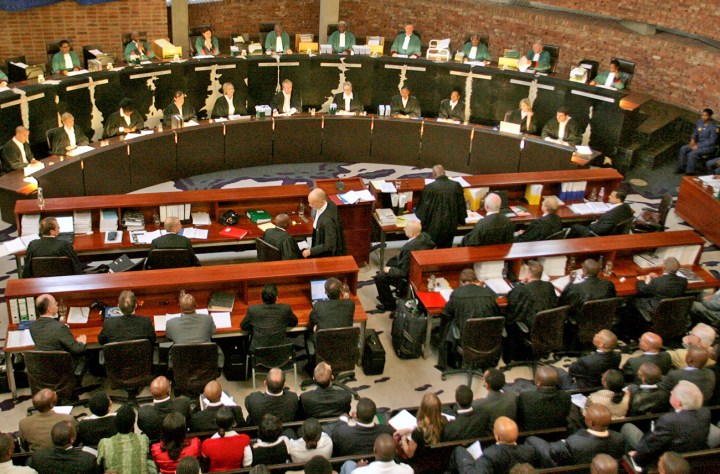Politics
Constitution Hill: A place of conflict

There really isn't a place in South Africa that is as politically contested as the Constitutional Court is currently. Our political fights have tended to use Constitution Hill as playing fields. Recently this has started to involve the court itself, with the appointment of Judge Mogoeng Mogoeng as Chief Justice. It's been through the mill on the Judge John Hlophe issue, and everyone is watching closely to see how it will handle a challenge to the constitutionality of the Protection of State Information Bill. So when these two issues come together on one day, it was always going to get interesting. STEPHEN GROOTES was in the cheap seats.
There is probably no better text book example of how bloody difficult it can be to get documents out of government than the Mail and Guardian’s attempt to see a report written by two judges about Zimbabwe; from 2002 nogal. It was then that former President Thabo Mbeki (remember him?) asked judges Dikgang Moseneke and Sisi Khampepe to go that benighted place and see how it was looking ahead of elections there. They wrote a report. He read it. No one else has. The paper asked for it in the North Gauteng High Court (as that is where the presidency sits). They won. The presidency, naturally, appealed; off to Bloem. They won there too. The presidency, you guessed it, appealed. And now finally, we get judgment.
Except that we get no final answer. The court has ruled, by five judges to four, that what should have happened is that the North Gauteng High Court judge hearing the case should have read the documents in question. They want that judge to have a “judicial peak” at the papers, and decide the paper’s request on the merits. And so back to the beginning we will go. The paper will have to wait for a decision from Pretoria, and then the circus of appeals will begin again.
The different judgments are fascinating, not so much for their content, but for the information they give us about the balance of forces at the court. We have that Info Bill coming soon, and this is possibly the clearest signpost we’ll get before then. For the majority then (i.e. in favour of sending it back to the North Gauteng High Court) were former Chief Justice Sandile Ngcobo, current Chief Justice Mogoeng Mogoeng, Acting Judge Kenneth Mthiyane, Judge Johan Froneman and Judge Zac Yacoob. In the opposite corner, and with the exasperation showing from their pores, Judge Edwin Cameron, Judge Bess Nkabinde and Judge Johan van der Westhuizen.
Deputy Chief Justice Dikgang Moseneke and Judge Sisi Khampepe had to recuse themselves – they wrote the report, making the balance a little off.
The dissenting judgment (which obviously, as a paid member of the tribe of scribes I would agree with) is very powerful, and quite simple. To sum it up, in Cameron’s words: “To give secret judicial examination of disputed records a central place in deciding claims to exemption, instead of enforcing the burden government rightly bears to justify withholding information, is in my view a grave error.” Or as Mail and Guardian editor Nic Dawes put it, “This puts the judge in the role of censor”. In short the majority’s decision means that in a similarly contested case, the only people in the courtroom who would not know what is contained in “secret” documents are the applicants; everyone else would have read them.
One can’t help but feel there’s been a little bit of ducking of the tough issues here. Cameron’s view is that the presidency simply didn’t put up enough evidence to justify why the documents should remain secret. As the majority judgment explains, because the applicant can’t see the contested document, it’s up to the government to justify its refusal to make it public.
Should the Info Bill come to Constitution Hill, the dynamics could be a little different. Moseneke and Khampepe will be back. Froneman and Yacoob are unlikely to vote in favour of a bill they see as giving government too much power; Mthiyane is no longer on the bench as his appointment was temporary (in the normal course of things, acting judges are appointed to the court on a regular basis so there was nothing sinister about this set of circumstances). And of course, more importantly, that case will be judged, as they all should be, on its merits.
In the Hlophe matter, however, judging things on their merits is hard. Firstly the backstory is so long and complicated, we have seriously thought about giving the Western Cape Judge President his own website. But in the meantime, here’s a Twitter-style version: 2008 Hlophe was accused by Concourt Judges of interfering in cases relating to Zuma; Judicial Service Commission eventually decides not to investigate; Freedom Under Law (FUL) and Helen Zille go to court, win in the Supreme Court. Hlophe appeals to the Constitutional Court.
Where, say his lawyers, most of the judges are conflicted. So they spent their Tuesday making the argument that Hlophe must be heard in the Constitutional Court because it’s the highest court in the land. But Zuma must appoint acting judges to hear the case, because of that conflict. Oh no you don’t, say FUL and Zille, to do that would allow the president to appoint acting judges to the highest court in the land in a case in which he himself is “touched” (their word, not mine).
It was at this point that Mogoeng was at his most interesting: “Where is he touched, we deal in facts, not allegations, bring us the facts here”. Anyone with a cynical turn of mind might think he was very quick to jump to Zuma’s defence. Zille’s people were quick to point to a precedent in the US, where in an apartheid reparations case, the judges of the Supreme Court were too conflicted (they owned shares in too many of the companies concerned) to hear the matter. As a result, the decision of the lower court stood. Hlophe’s advocate Thabani Masuku had a ready response to that, “Our system cures that problem, through acting judges”. In other words, we’re different, we should appoint acting judges. Mogoeng wanted to know if it could be quantified, which was worse: perceptions of political interference (if Zuma appointed acting judges for this case), or judges hearing a case in which they had an interest. It’s a good question. He did not get a quick answer.
And neither will we. Judgment, as usual, has been reserved. We’re unlikely to get a verdict before Christmas. And when it comes, it will just be the start of something new. Because this is only about whether the court, as it is currently constituted, can hear the case. Not the case itself. As I’ve said before, Hlophe is to our legal system what the Arms Deal is to our politics. And that’s been dealt with only when the right set of circumstances allowed the person in charge to act in a way that didn’t hurt himself, but would also lance the boil. Judges are different to politicians – we’re told. So I don’t know what it’s going to take here to bring the matter to its highpoint.
In the meantime Constitution Hill is going to continue to make news. It’s a hot place. And as those in Durban at the moment will tell you, it’s likely to get quite a few degrees warmer. DM







 Become an Insider
Become an Insider